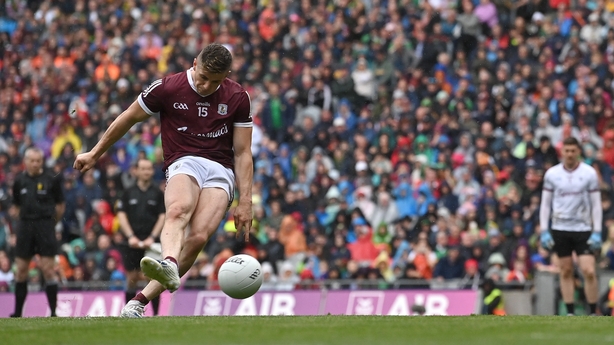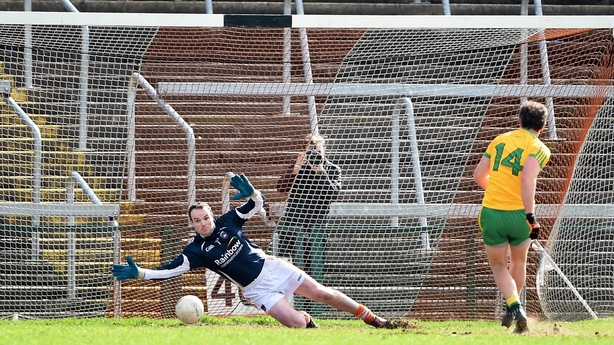A top GAA goalkeeping coach has said that the introduction of penalty shoot-outs has led to such a scrutiny on takers' technique and preferred side that the data is almost becoming irrelevant – with a return to instinct over information now prevailing for both shooter and goalkeeper.
Former Armagh goalkeeper Philip McEvoy, who has worked closely with a number of clubs and counties in Ulster and Leinster in recent years, feels that teams invest so much time preparing for such an eventuality that the data is often immaterial as shooters are beginning to opt to aim for their weaker side in order to counter what the goalkeeper may already know.
"My perception of penalty kicks has changed over the last 12 months," said McEvoy, who was behind the goals in Clones on Sunday as Derry claimed the Ulster title on penalties.
"That came pretty much on the back of Armagh’s penalty shoot-out defeat to Galway at Croke Park last year.
"Goalkeepers never share their technique when facing penalties for obvious reasons, however having just hit 40 I don’t see myself being back in nets any time soon so happy to share that when I was playing, I would have, in the majority of cases, dived to what is known as the closed side [a player hitting to the opposite side to his preferred foot], as in the player was kicking across himself.
"If it was a right-footed player, I would be diving to my right. If it was a left-footed player, I’d be going to my left.
"There would have been the odd exception using my own specific knowledge of the taker. For instance, my old club-mate Aidan O’Rourke always preferred hitting to his open side [a right-footed player hitting to the right-hand side] so I would have adjusted if I had faced him in training.
"That technique worked for me in the majority of my career, but there wasn’t much science behind it other than I felt kicking across yourself gives you that extra bit of power needed as opposed to opening your body up, which leaves it more difficult to generate power.
"On reflection, over my career that technique served me well.
"I almost always went to what I perceived was their preferred side, that closed side, because I would regret it if I didn’t. If they changed it up and scored, you’d just have to say 'fair play’ and sometimes you’d just have to hold your hands up.
"I always thought too that if they are hitting to their ‘weaker’ side, they would have more chance missing the target, which would be job done in my eyes.
"There are many other techniques used by goalkeepers to anticipate where the taker is going to place the penalty, the placement of standing foot, the angle of the run up - and each keeper will have their own method."
Over the years whilst working with counties and clubs, McEvoy felt that his technique stood firm in the majority of cases.
But he’s seeing a difference since the ‘winner on the day’, including penalties, came into effect in the 2019 season and he puts it down to the fact that players are having to take lot more penalties than in previous years.
"A few years ago, a penalty taker may only get one or two penalties a year, if that. Now we see penalty takers having to step up perhaps four or five times in the one season, hence the need to mix it up," he added.
He uses Galway as the perfect example of that.
In the 2019 FBD League semi-final, played weeks after the new rule was introduced, Galway defeated Mayo 3-2 penalties with all four Tribe kickers going to the closed side – right-footers hitting to the goalkeeper’s right-hand side.

In their dramatic shoot-out success against Armagh last year, their four kickers all went to the open side – two left-footed kicks going to Rafferty’s right and two right-footed kicks going to Rafferty’s left.
"When I was working with Down, I was trying to prepare information on Shane Walsh but a player of that quality is very hard to work out. I think of his previous five at that stage he had hit three to his left and two to his right.
"In that instance, all I could say to Gary McMahon, the Down goalkeeper for that match in the league last year, was that you just had to trust your instinct if Walsh was awarded a penalty. Players like Walsh have that bit of extra quality, and it is really a mental battle then as much as anything else.
"In that Galway-Armagh shoot-out, according to the research I had compiled at the time - which is very much open to scrutiny, I might add - all seven players went to their perceived less favoured side and in most cases the goalkeeper dived the wrong way.
"They anticipated that they would hit to their preferred side, which given the extreme pressurised situations the kickers were facing, was a fair assumption.
"Unfortunately, two of Armagh’s takers missed the target that day so I’m sure Galway goalkeeper Connor Gleeson would say that whatever his method was, it worked.
"On the back of that shoot-out, it became clear that whilst goalkeepers and their coaches are doing as much research as possible to try to anticipate where the taker is going, the takers are aware of this hence it has as much become a game of double bluff as anything else."
To back up McEvoy’s thinking, soccer goalkeeper data scientist John Harrison examined the penalties at the 2022 World Cup and discovered that 64% were hit to the closed side, 22% were hit to the open side and 14% were hit centrally. Goalkeepers dived to the closed side 61% of the time, to the open side 33% of the time and just 6% centrally.
It means that that teams were underestimating the amount of times a penalty would be struck down the middle.
Odhran Lynch saves, before Ciaran McFaul scores the winner as Derry retain their Ulster SFC title at Clones
— The Sunday Game (@TheSundayGame) May 14, 2023
📺Watch: https://t.co/AKAre5FHdN
⌨️Updates: https://t.co/5BrgfqVUtd
📻Listen: https://t.co/fTWa53I9yS #RTEGAA pic.twitter.com/NkwBBpt9QB
McEvoy doesn’t imagine too many penalties in Gaelic football being hit straight down the middle, but he does see further trends with soccer emerging.
"It’s a bigger goal in soccer so to have any chance of saving a penalty that is hit close to the corner you need to commit fully and probably a bit earlier than in Gaelic.
"With that in mind, down the middle could be a good option but a bit riskier in the GAA. I’m sure some players will take it as an option though."
Once the All-Ireland knockout series gets underway, McEvoy believes that the research done by both goalkeepers and penalty takers will go up a notch again.
"Look at soccer for instance, penalty shoot-outs have been used since the 1970s yet its only in the past few years or so that we have witnessed goalkeepers using initiatives like having notes or graphics on their water bottles with info on the preferred side of takers.
"Look at Jordan Pickford’s penalty save against James Maddison in the Everton against Leicester game recently. The graphic stuck to the side of his water bottle showed that Maddison likes to go 20% left, 20% right and 60% down the middle, so Pickford stayed down the middle and Maddison basically passed it to him.
"Will we see similar antics later on the summer in Croke Park when, dare I say, the All-Ireland final is being decided on a penalty shoot-out? Maybe we’ll see keepers running to their water bottle to see what is the preferred side of the next penalty taker.

"The margins are that fine, as Armagh have found out to devastating effect twice in the last year, no stone can be left unturned.
"We’re even at that stage now were the penalty kicker even knows what side is weaker one for the goalkeeper, if he has one.
"The penalty takers themselves and indeed opposition goalkeeper coaches are studying goalkeepers and their preferred side for diving to the point whereby even when the shoot-out is actually taking place, they are trying to decipher where the keeper tends to dive."
McEvoy expects shoot-outs to evolve as they become more common.
"To date we have seen standard run ups to penalties in Gaelic shoot-outs, however will takers change this with the more shoot-outs they see and notice if a certain keeper moves early?
"We have seen stuttering run ups in soccer with various success and also one-step-back penalties, these are all methods to try and out-think the goalie.
"The flip side of all that is, considering the amount of coverage there is of the modern game and with keepers and takers now knowing the amount of work being done behind the scenes to get that edge in shoot-outs, will we get to the point whereby the analysis of the data will get to saturation point and it will simply revert back to trusting your instincts and going with your gut each time?
If there were two keepers in the goal they still wouldn't have saved Conor Glass's penalty
"This was highlighted more than ever when listening to Derry's Conor Glass post-match when he said that he changed his minds several times when going to hit his penalty.
"For a goalkeeper coach to hear that you wonder why bother doing any research at all! Although with Glass’s penalty, if there were two keepers in the goal they still wouldn’t have saved it.
"There is so much focus and pressure associated with the goalkeeping position these days that, despite the fact that my county has been on the wrong end of the two most high profile shoot-outs since its introduction, I love the fact that the pressure is off the keepers and it’s their chance to make themselves the hero, which Odhran Lynch did yesterday and full credit to him.
"Penalties are quickly becoming such a big aspect of knockout championship that it needs serious time investment, both on the desktop and the training field.
"I can only imagine the devastation faced by the players losing out on silverware due to penalties, it’s bad enough as a supporter."
We need your consent to load this rte-player contentWe use rte-player to manage extra content that can set cookies on your device and collect data about your activity. Please review their details and accept them to load the content.Manage Preferences
Listen to the RTÉ GAA Podcast on the RTÉ Radio Player, Apple Podcasts, Spotify or wherever you get your podcasts
Watch highlights of the weekend's football and hurling championship action on The Saturday Game and The Sunday Game, 9.30pm on RTÉ2 and RTÉ Player

